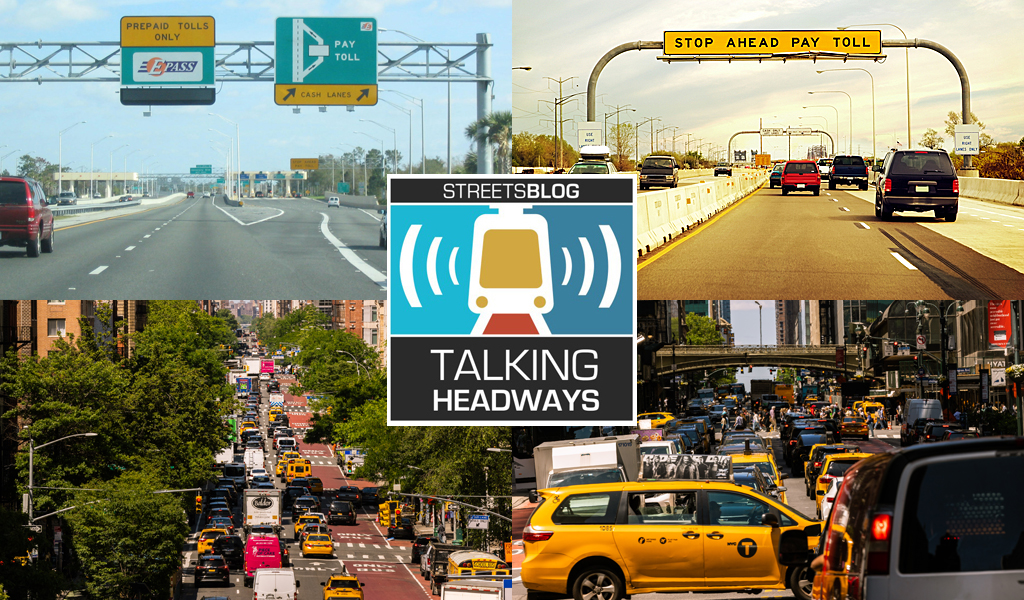This week, we’re joined by Mike Warren, senior vice president at WSP, who chats with us about road user charging including how the discussion has changed over the last decade and the idea of treating roads as a utility by paying for driving by the mile. We also discuss policy considerations including reducing driving and congestion, privacy considerations, and replacing existing use taxes. It’s a great companion piece to my colleague Kea Wilson’s Streetsblog USA piece this week.
For the full unedited transcript, click here. A partially edited section is below the player.
Jeff Wood: So let’s go over the basics. So can you explain what a road user charge is and maybe why it’s being discussed at all?
Mike Warren: Simply stated, road usage charge treats roads like a utility. You pay for every mile you drive, and instead of paying for road use based on the number of gallons that you put in your vehicle or the gas tax that’s assessed on those gallons, you’re paying based on every mile you drive. And what really started this here in the U.S. was the influx of electric vehicles, the increase in vehicle fuel economy, and the decline purchasing power of the gas tax. The federal gas tax, for example, hasn’t been raised since the 1990s. Many states haven’t raised their gas taxes since then as well. So what we’re finding is the purchasing power is declining as well.
So with all this happening, states are starting to explore innovative methods to fund their transportation infrastructure. We’ve looked at a lot of different options, but what we’ve found is road use charge really provides one of the more fair and future focused solutions.
Jeff Wood: What does that fairness look like? I know a lot of people think that [gas] taxes cover road-building in the U.S., but that’s not really true because there’s property taxes, they’re general fund transfers that have been happening at the federal level for a long time. Other mechanisms cover a lot more than people think. So I’m wondering about that fairness and you know, how this might actually replace the gas tax, but also why we think it’s an idea that works. And, and you just mentioned that obviously to a certain extent, but I’m wanna kind of get a little bit deeper into it.
Mike Warren: Based on a per-gallon consumption model, vehicles that are less fuel efficient are purchasing more gallons of fuel, which means they’re paying more gas tax, which means they are effectively subsidizing those vehicles that have a higher fuel economy, not taking emissions into consideration, not taking weight into consideration. It’s just the vehicles that purchase more fuel are paying more for road use than a vehicle that is more fuel efficient. So road use charge levels that playing field. You have electric vehicles that some states have imposed vehicle registration surcharges, but what we have found in a lot of states is that still doesn’t equate to, you know, what an average vehicle would pay every month for road use. So road use charge means everyone is theoretically going to pay the same per mile rate.
Jeff Wood: But one of the features of the gas tax was that you were penalized for having a larger vehicle that got a worse gas mileage. And in places like Japan, where vehicle sizes and engine displacement are the things that are taxed rather than necessarily the distances, I’m wondering with the road user charge, do you kind of lose that disincentive to have larger vehicles that might impact safety or things like that?
Mike Warren: You know, what we have found is there’s not a considerable amount of difference in weight between an EV and a larger truck. You know, we’re looking at it from a vehicle, you know, how much degradation on the road is occurring. From a safety perspective or you know, if you’re wanting to incentivize a certain vehicle type or disincentivize others, you can certainly do that through variable pricing as well.
Jeff Wood: From a pollution standpoint, a lot of particulates and things like that are generated from brake dust and tire particles, not necessarily just the exhaust from a vehicle. And so heavier vehicles are actually taking up 30 percent more tires to operate. So those other considerations are interesting and, you know, using the distance-based charge rather than say a gas tax is, is kind of interesting to kind of put those things together and start to think about how they might mesh.
Mike Warren: We start with what we call a “revenue neutral rate” and that’s what’s the average equivalency to the state motor fuel tax for a vehicle, based on average fuel economy, based on the number of miles that vehicle will drive in a month or a year. And then we establish what we call the revenue neutral rate, and then stakeholders can evaluate that rate. We can certainly forecast revenue to determine what the financial impacts would be and you can adjust that rate based on one to many criteria.
The post Talking Headways Podcast: How About Road Use Charges? appeared first on Streetsblog USA.
The post Talking Headways Podcast: How About Road Use Charges? appeared first on Streetsblog New York City.






